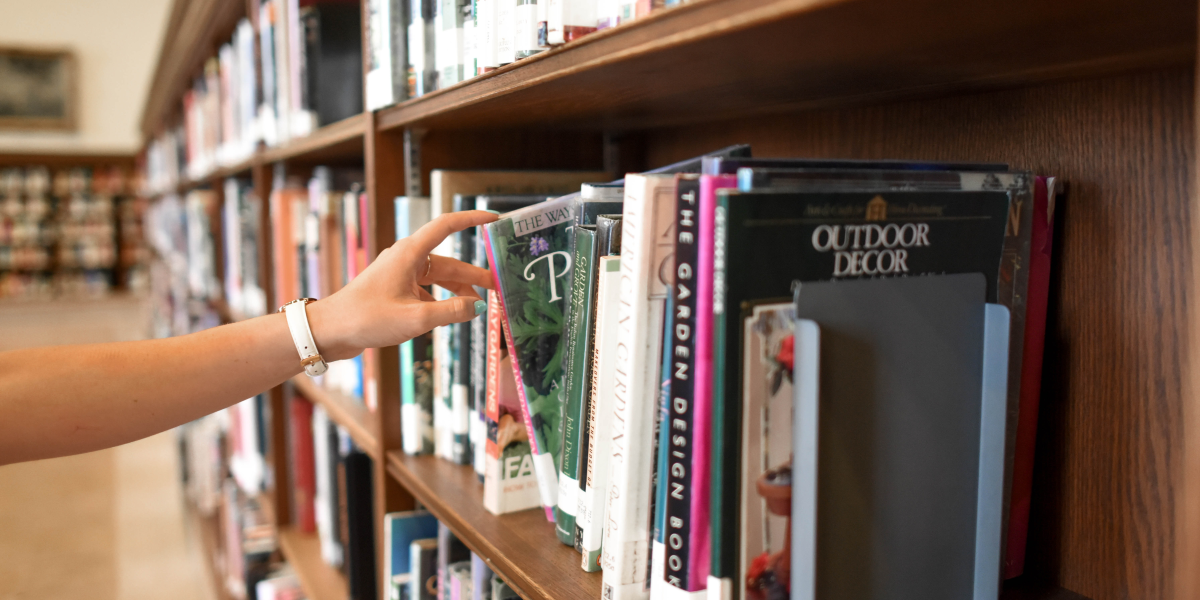The UMD INFO library field study program fosters growth and learning for MLIS students interested in school library careers.

As the information landscape continues to evolve, so do the roles of librarians within educational institutions. With this shifting landscape comes the need for highly skilled and adaptive professionals in the field. The library field study program is an opportunity for Master of Library and Information Science (MLIS) students with a school libraries focus—a specific track for students who want to work in a school library or media center in a K-12 setting—to become that type of professional.
In their last year of the MLIS program, students are required to do two internships—one in an elementary school and another in a middle or high school, preferably in two different districts. This gives students an opportunity to work in different settings. “There’s a world of difference between working with little ones and working with seniors in high school,” says Bridgette Comanda, school library internship lead.
While it’s preferred that students do their internship at a public school, working at an independent or charter school is also an option. Students are generally able to pick where they’d like to do their internship—one student worked in Georgia and another in Guangzhou, Hong Kong. The internship isn’t an overwrought or heavily scripted experience. “We want to create a lot of latitude for students to create meaningful experiences for themselves,” Comanda says.
We sat down with Comanda to learn more about how the field study program helps MLIS students build a solid foundation for their careers in school librarianship.
How has the field study program evolved over the years?
For the library speciality in the MLIS program, there has been a turn toward social justice. We have created the Diversity and Inclusion focus area, one of the first in the country for MLIS programs. No matter what your role is or what kind of library you’re in, how can you make sure that access to information is equitable and good for society? We’ve seen recently how information can be weaponized and what results from that.
Can you tell us about some of the most impactful experiences students have had while participating in the field study program?
When schools shut down during COVID that was a huge thing. Every student that went from going in person to finishing up their internships online realized the breadth and depth of different kinds of access issues that students have in public schools.
I have also had other students who have had really profound experiences. On the very first day for one student there was an active shooter drill. Everything ended up being OK; it was a false alarm, but it really shaped her beliefs around gun control and advocating for children’s safety.
How does the library field study program and the MLIS program in general prepare students for careers as librarians or media center specialists?
This is a field heavily invested in professional associations, whether it’s the American Library Association, the Association of College and Research Libraries, or the American Association of School Librarians (AASL). Each of these associations has a set of ethics and documentation to help guide the professionalization of librarianship. They look at what it means to be a good librarian, and what it means in different contexts. The MLIS program does a great job of creating classes that speak to the different criteria those professional associations have laid out.
School librarians should be able to inhabit a myriad of roles. They can be instructors, reading and literacy specialists, text specialists, and instructional designers. Trying to plan classes that speak to each of those roles while also fulfilling state requirements is a major guiding force. What we end up having is a specialization that reflects the current professional expectations and standards set by the important professional bodies. That creates a situation where students are learning about what they’re expected to do. We are teaching students about how to be collaborative instructors and work with other school professionals. We’re giving them support in how to create deep learning experiences with technology. As a whole, we aim to create a curriculum and an experience that speaks to what is expected of school library professionals.
Looking ahead, what are some of the key trends and challenges facing libraries, and how do you see the library field study program evolving to address these?
The biggest challenge right now is this conversation around censorship and book banning—something that has gained prominence as conservatives have started picking straw men to put over the fire. When they started to target critical race theory in the curriculum, you started seeing more parent groups taking an interest in what was coming through school libraries and targeting books that spoke about different narratives in the history of America or experiences in contemporary America. Seeing those things get inflamed in the media and watching them spread is one of the most dramatic trends facing libraries today.
We’re making sure our students are well-informed about why libraries are a benefit to the public as a whole, especially when it comes to providing students with resources they may not have any other way to access. We’re also preparing them to defend their choices and appropriately respond to these conversations. We also encourage them to get involved in advocacy groups that defend their positions as well as PTAs in order to create relationships with parents who might have an honest question about why a certain book is in the library. We also encourage them to get involved in local government because education is so political.